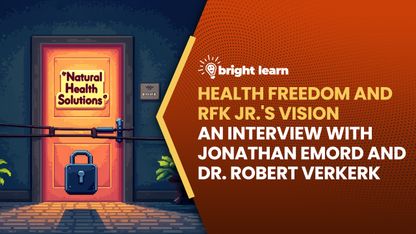
- Millions of women experiencing brain fog during perimenopause may actually have an iron imbalance, not just hormonal changes, according to a University of Oklahoma study.
- Even women with "normal" iron levels can suffer cognitive decline if their iron isn’t optimized, but dietary adjustments can restore mental clarity without risky pharmaceuticals.
- The study found that suboptimal iron levels impair memory, attention, and brain signaling, while adequate iron supports myelin production, neurotransmitter balance, and neuron function.
- Unlike synthetic hormone treatments, natural iron sources like oysters, spinach, and vitamin C-rich foods safely improve iron levels without increasing brain iron linked to Alzheimer’s.
- Conventional medicine often overlooks iron testing for perimenopausal women, despite heavy menstrual bleeding depleting iron stores, making dietary changes a crucial yet underutilized solution.
Millions of women battling brain fog during perimenopause may be suffering needlessly—not from a hormone deficiency, but from an easily corrected iron imbalance.
A groundbreaking University of Oklahoma study reveals that even women with "normal" iron levels can experience cognitive decline if their iron isn’t optimized for their age. The best part? Boosting iron through diet can restore mental clarity without relying on Big Pharma’s synthetic drugs and risking dangerous brain iron accumulation linked to Alzheimer’s.
For years, women navigating the turbulent transition to menopause have been told their memory lapses and sluggish thinking are inevitable. Mainstream medicine often pushes hormone replacement therapy (HRT) or antidepressants, ignoring a far simpler solution: addressing nutritional deficiencies that sabotage brain function. Now, peer-reviewed research confirms what natural health advocates have long argued: iron is foundational to cognitive health, and restoring it holistically can combat one of menopause’s most frustrating symptoms.
The science behind iron and cognition
Published in Nutrients, the OU study examined 39 perimenopausal women with either low or normal iron levels (none were anemic). Using blood tests, MRIs, and cognitive assessments, researchers found that women with suboptimal iron scored worse on memory and attention tasks. EEG scans showed weaker brain signals in this group, while those with adequate iron displayed sharper mental performance.
Lead researcher Dr. Michael Wenger explained the real-world impact: "If I were to give a woman with iron deficiency a simple task ... the deficiency would cost her about 150 milliseconds per decision." While that delay seems minor, it compounds during complex tasks like conversation or problem-solving.
Iron helps with four key brain functions. It supports myelin production to insulate nerve fibers and speed signal transmission. It's vital for neurotransmitter synthesis, particularly dopamine and serotonin balance. It also supports nerve cell energy by facilitating oxygen transport to neurons and enhances synapse formation, improving communication between brain cells.
The study debunked a major concern: increasing blood iron did not raise brain iron levels, which are tied to neurodegenerative diseases. "Having iron levels that are at or above what you should expect for your age does not mean you’re accumulating more iron in your brain," said Wenger. This finding is a green light for women to safely optimize iron without fear of long-term harm.
How to boost iron naturally
Unlike synthetic HRT, which carries risks like blood clots and cancer, dietary iron offers a side-effect-free solution. Nutritionist Vandana Sheth recommends animal sources of iron such as oysters, chicken thighs, or salmon, paired with spinach. For plant-based options, consider iron-fortified cereal, chickpea-quinoa salad, or tofu stir-fry with vitamin C-rich vegetables to enhance absorption.
The NIH warns against excessive iron supplements, which can cause nausea and ulcers, but food-based adjustments are considered safe. "If a woman has suboptimal iron levels, and she makes some simple changes in her diet, she could be back at more optimal levels within three months," Wenger noted.
A missed opportunity in conventional care
Despite the evidence, most OB-GYNs don’t test for iron deficiency unless anemia is suspected. "Low iron could easily be one of the reasons a woman is experiencing brain fog during the menopausal transition," Wenger emphasized. Heavy menstrual bleeding, which is common in perimenopause, depletes iron stores, yet doctors rarely address it proactively.
This research empowers women to take control of their cognitive health without relying on risky pharmaceuticals. By prioritizing iron-rich foods and rejecting the myth that brain fog is inevitable, women can navigate menopause with clarity naturally. As the medical-industrial complex peddles expensive, symptom-masking drugs, the real solution might be as simple as a nutrient-dense meal.
Sources for this article include:
Please contact us for more information.





































